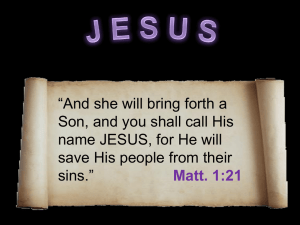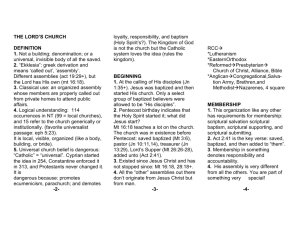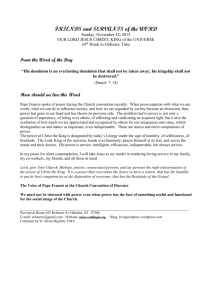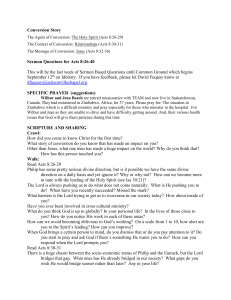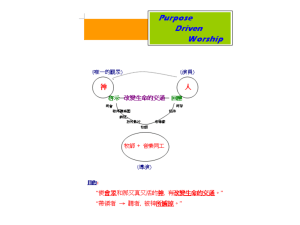Feast of All Souls - Catholic Catechist
advertisement
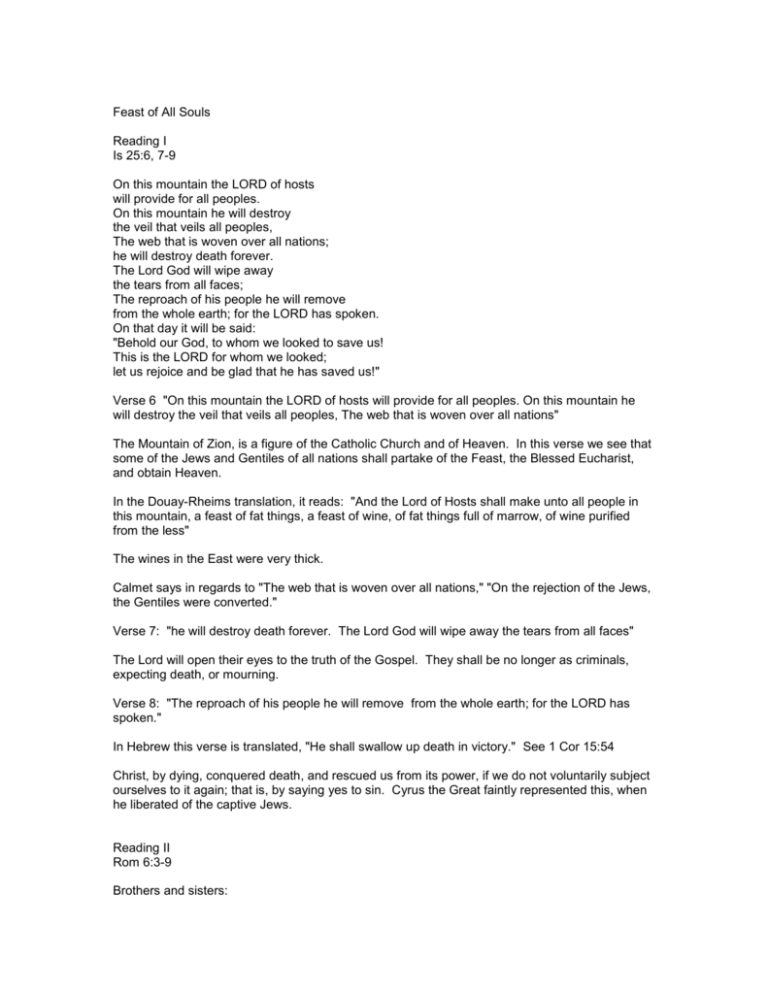
Feast of All Souls Reading I Is 25:6, 7-9 On this mountain the LORD of hosts will provide for all peoples. On this mountain he will destroy the veil that veils all peoples, The web that is woven over all nations; he will destroy death forever. The Lord God will wipe away the tears from all faces; The reproach of his people he will remove from the whole earth; for the LORD has spoken. On that day it will be said: "Behold our God, to whom we looked to save us! This is the LORD for whom we looked; let us rejoice and be glad that he has saved us!" Verse 6 "On this mountain the LORD of hosts will provide for all peoples. On this mountain he will destroy the veil that veils all peoples, The web that is woven over all nations" The Mountain of Zion, is a figure of the Catholic Church and of Heaven. In this verse we see that some of the Jews and Gentiles of all nations shall partake of the Feast, the Blessed Eucharist, and obtain Heaven. In the Douay-Rheims translation, it reads: "And the Lord of Hosts shall make unto all people in this mountain, a feast of fat things, a feast of wine, of fat things full of marrow, of wine purified from the less" The wines in the East were very thick. Calmet says in regards to "The web that is woven over all nations," "On the rejection of the Jews, the Gentiles were converted." Verse 7: "he will destroy death forever. The Lord God will wipe away the tears from all faces" The Lord will open their eyes to the truth of the Gospel. They shall be no longer as criminals, expecting death, or mourning. Verse 8: "The reproach of his people he will remove from the whole earth; for the LORD has spoken." In Hebrew this verse is translated, "He shall swallow up death in victory." See 1 Cor 15:54 Christ, by dying, conquered death, and rescued us from its power, if we do not voluntarily subject ourselves to it again; that is, by saying yes to sin. Cyrus the Great faintly represented this, when he liberated of the captive Jews. Reading II Rom 6:3-9 Brothers and sisters: Are you unaware that we who were baptized into Christ Jesus were baptized into his death? We were indeed buried with him through baptism into death, so that, just as Christ was raised from the dead by the glory of the Father, we too might live in newness of life. For if we have grown into union with him through a death like his, we shall also be united with him in the resurrection. We know that our old self was crucified with him, so that our sinful body might be done away with, that we might no longer be in slavery to sin. For a dead person has been absolved from sin. If, then, we have died with Christ, we believe that we shall also live with him. We know that Christ, raised from the dead, dies no more; death no longer has power over him. Verse 3: "Know you not that all we, who are baptized in Christ Jesus, are Baptized in his death?" . The Apostle here alludes to the manner of administering the Sacrament of Baptism, which was then done by immersion or by plunging the person baptized under the water, in which he finds a resemblance of Christ's death and burial underground, and of his resurrection to an immortal life. So must we after Baptism rise to lead a quite different life: having been also, when we were baptized and made Christians, planted as branches ingrafted in Christ, let us endeavor to bring forth the fruits of a virtuous life. Verse 7: "For a dead person has been absolved from sin." Some translate this as being freed from sin; this is true; however; in this case I think it is better to retain the word justified, which appears in the Douay-Rheims and other translations. The reason is, the word "justified" is a legal term used in courts of justice. To be "Justified," then would mean the same as being "acquitted," so a man could not be questioned again on that account; and so are sinners, when their sins have been forgiven them. Gospel Jn 6:37-40 Jesus said to the crowds: "Everything that the Father gives me will come to me, and I will not reject anyone who comes to me, because I came down from heaven not to do my own will but the will of the one who sent me. And this is the will of the one who sent me, that I should not lose anything of what he gave me, but that I should raise it on the last day. For this is the will of my Father, that everyone who sees the Son and believes in him may have eternal life, and I shall raise him on the last day." John 6:37-38 "All that the Father gives Me, shall come to Me and him that comes to Me, I will not cast out. Because I came down from Heaven, not to do My own Will, but the Will of the Father, that sent Me." Verse 38: Christ did not say this as if He did not whatever He wished; but He recommends to us His humility. He who comes to Me shall not be cast forth, but shall be incorporated with Me, because He shall not do His own Will, but that of My Father. And therefore, shall not be cast forth; because when he was proud, he did his own will, and was rejected. None but the humble can come to me. St Hilary of Pointers and St Augustine says "An humble and sincere Faith is essentially necessary to believe the Great Mysteries of the Catholic Faith, established by Christ, by means of which we come to God and believe in God. John 6:40 "And this is the will of him that sent me, that every one which sees the Son, and believeth on him, may have everlasting life..." This belief in Jesus, is not a simple "I believe you are the Christ, the Son of God." No, it is much more than that. It is believing that He can make it possible to be present in the world at all times, from the Rising of the Sun to its Setting, forever and ever; just as it was Prophesied in Malachi 1:11. It is called Faith, and that Faith is believing that what is in the appearance of bread and wine, the perfect symbols of unity, made from a multiplicity of grain and a multiplicity of grapes, is actually His flesh. The same flesh that hung on the Cross. At the Holy Sacrifice of the Mass, Christ's Body, Blood, Divinity and Soul are confected in the Eucharist by the priest, who can trace his priesthood back to the Apostles, who received Holy Orders from Christ Himself. This is Faith, a simple statement of "I believe in Jesus" is nothing more than a cop out. This has been the teaching of the Catholic Church for nearly 2000 years, and once again, if we are wrong, then who was it that lied to us, but Christ Himself? How on earth can a new teaching coming out 1500 years later possibly be true? It cannot. This is a classic example of the False Prophets our Blessed Lord warned us about. Christ founded a Church, He did not write a book, and the Bible was never meant to be a Rulebook or a book to follow. This was the man-made assumption of Luther and all those who fell into his error.


